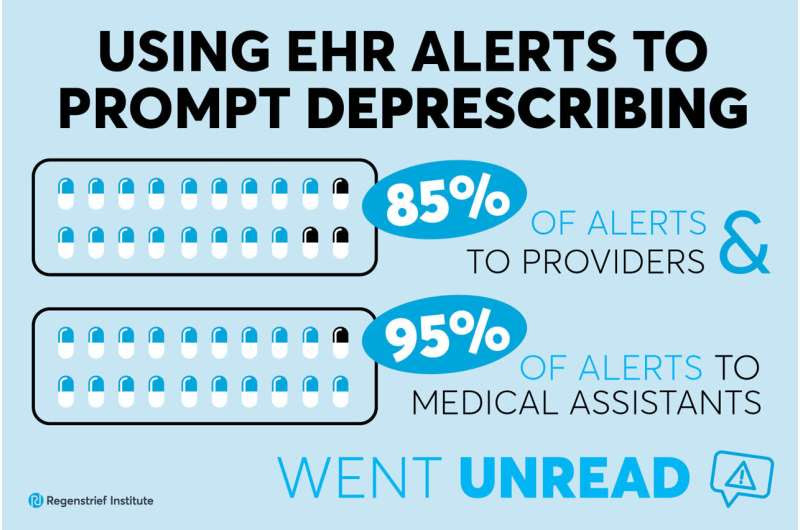by Regenstrief Institute

The vast majority of electronic health record (EHR) alerts attempting to reduce the prescribing of high-risk medications linked to dementia in older adults went unread in a study led by Regenstrief Institute Research Scientist Noll Campbell, PharmD, MS published in the June 2021 print issue of the Journal of the American Geriatrics Society. Credit: Regenstrief Institute
The vast majority of electronic health record (EHR) alerts attempting to reduce the prescribing of high-risk medications linked to dementia in older adults went unread in a study led by research scientists from Regenstrief Institute, Purdue University, and Indiana University School of Medicine. The goal of the intervention was to facilitate the deprescribing of anticholinergics through both provider and patient-based alerts, however, engagement with the alerts was so low, the study team was unable to conclude if this approach could be an effective method.
Anticholinergics are drugs that affect the brain by blocking acetylcholine, a nervous system neurotransmitter that influences memory, alertness, and planning skills. They are linked to dementia and prescribed for many conditions common in older adults including depression, urinary incontinence, irritable bowel syndrome, and Parkinson’s disease. These medications are used by approximately one in four older adults each year, and nearly half of older adults have used this type of medication at least once in a five-year period.
Many medical groups have come out in support of deprescribing anticholinergics, but it is challenging to execute in an already busy primary care environment.
“Deprescribing is very complex and rarely prioritized over common medical problems during visits with primary care providers,” said study lead author Noll Campbell, PharmD, M.S., a research scientist at the IU Center for Aging Research at Regenstrief and assistant professor of pharmacy at Purdue University College of Pharmacy. “In this study, we used principles of behavioral economics in the design of EHR nudges directed at both providers and patients to promote the deprescribing of high-risk anticholinergic medications. However, very few of the alerts were viewed by either recipient, so we are now evaluating how we can change or improve this approach.”
In this study, an alert let the provider know that the patient had high-risk anticholinergic medications prescribed in the medical record and offered alternatives to those medications. Alerts also prompted staff to play a video providing education about the medicines and modeling a discussion that led to a change in prescription for patients who were prescribed one of the target medications.
The research team conducted the cluster-randomized trial in Eskenazi Health clinics and compared the medication records to the previous year to see if there were any changes. They found there were no significant differences in deprescribing between the control group and the intervention group.
During the course of the study, 85 percent of alerts to providers and 95 percent of alerts to medical assistants went unread, so study authors cannot conclude that priming patients and providers for the discussion are not a feasible strategy, only that the methods used in this study were not successful in reaching the target recipients.
“One option going forward is to experiment with different design approaches in EMR-based nudges,” said Dr. Campbell. “Alternatively, a shift towards human-based interventions that can manage the complexity of deprescribing activities may be more effective at deprescribing high-risk anticholinergic medications. While we pursue the goal of understanding clinical implications, we are also cognizant of the scalability of interventions if there is clinical benefit realized by reducing these high-risk medications.”
Dr. Campbell and his colleagues at Regenstrief are currently conducting a clinical trial designed to determine if stopping anticholinergic medications results in sustained improvements in cognition. This trial involves clinical pharmacists working with physicians and patients to switch to safer medicines.
Another study at the IU Center for Aging Research at Regenstrief is testing an app called BrainSafe, which provides information on anticholinergics to patients with the goal of leading them to initiate a deprescribing conversation.
“Multicomponent behavioral intervention to reduce exposure to anticholinergics in primary care older adults” is published in the June print issue of the Journal of the American Geriatrics Society.

Leave a Reply